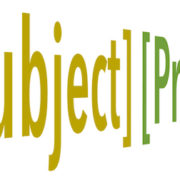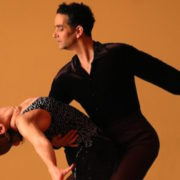Bigly?
 We can learn an important fact about English pronunciation from the controversy over whether US Presidential candidate Donald Trump has invented a new adverb, bigly. Britain’s Daily Telegraph thought this was the case:
We can learn an important fact about English pronunciation from the controversy over whether US Presidential candidate Donald Trump has invented a new adverb, bigly. Britain’s Daily Telegraph thought this was the case:
Actually it’s hard to hear the end of Trump’s sentence there because of the applause. Here’s a clearer utterance which has been declared online to be bigly:
I myself thought for a while that Trump was ending many of his sentences with bigly, until I realised that it was more likely to be the phrase big league, with a final /g/. Wiktionary lists big league not only as a noun (referring to a major league, typically in sport) but also as an adjective (e.g. He made a real big league play) and as an adverb meaning ‘to a significant degree’. It’s as an adverb that Trump uses it.
With big league in mind, it’s easier to hear a final /g/ in many of Trump’s utterances. Here’s a sentence from his first debate with Hillary Clinton, then the two instances of big league slightly slowed down:
So how does the controversy arise in the first place? One factor is phonetic. The sound /g/ is a ‘stop’, which means the breath from the lungs is completely stopped; in /g/, the back of the tongue is raised up against the rear palate to stop the air. When /g/ is followed by a vowel, the stopped air bursts out as the closure is released. But if there isn’t a following vowel, American speakers frequently suppress or weaken the release burst; and without their release burst, stop sounds are harder to hear. Listen again to the first audio clip above and hear how there’s no audible /t/-burst at the end of either that or out. British and other accents can do this sort of thing, but it’s more general in AmE.
Another factor is that it’s relatively uncommon to hear big league as a sentence-final adverb; big time is a more common equivalent. On the other hand Trump does tend to talk in simple, large-scale terms (great, huge, etc.), and an adverbial form of the basic word big fits in with that.
Further notes
If Trump is occasionally saying bigly, which I doubt, he is in fact resurrecting a Middle English word, as in
There cam a yonge man bygly made.
–Sir Thomas Malory, 15th century
Dictionaries often write league and -ly with different vowels, /iː/ in league and /i/ in -ly. The fact that people on both sides of the Atlantic have heard league as -ly tends to support the view that they’re really just the same vowel.
Intonation, can mark subjects
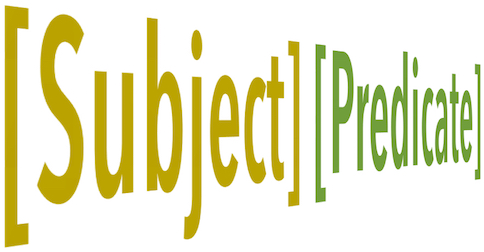 An item on the BBC news website this week contains a fairly common type of punctuation ‘error’:
An item on the BBC news website this week contains a fairly common type of punctuation ‘error’:
A little known species driven to the edge of extinction by poaching, has gained extra protection at the Cites meeting in South Africa.
Strictly, there should either be two commas, surrounding the phrase driven to the edge of extinction by poaching, or else there should be none. (I’ve copied the ‘error’ in the title of this post.) Why did the writer use only one comma?
The answer, I think, is that it marks a major division which is often reflected in intonation, between the subject and the predicate of a statement. The subject is the entity about whom the statement is made; the predicate, which begins with the verb, says something about the subject. For example:
Rising prices have hurt budgets most.
subject: [rising prices] predicate: [have hurt budgets most]
Here are two more examples of subject-marking commas that I’ve seen in print (one British, one American):
One of the biannual exams they had, involved the committing to memory of one complete enemy target briefing.
This spectacular aerial view of the island valley of Avalon, is highlighted by the clear blue harbor waters…
It may not be considered correct to write a comma after a subject, but native speakers do often place an intonation boundary here, i.e. they give separate intonation patterns to the subject and the predicate. We often hear this in speeches, in teaching and in news broadcasting. Here’s a BBC correspondent:
And an American example:
than the private sector]
Both of those examples exhibit a common pairing of intonation patterns: a Fall-Rise on the subject, and a Fall at or near the end of the predicate. Here are the two subject words prices and government, both said with a Fall-Rise:
I’m sure that the intonational marking of the subject-predicate boundary encourages native speakers to write a comma there. Non-natives can avoid subject-marking commas when they write (the one in the title of this post is ironic); but subject-marking intonation is worth practising, especially when the subject is substantial (not a weak pronoun). Here are two more examples from British and American news:
half the remaining elephants disappear…]
Again, the subjects are marked by the Fall-Rise:
The Fall-Rise is certainly not the only pattern used on subjects, but it’s certainly common enough to be worth practising.
Perfeckly strickly
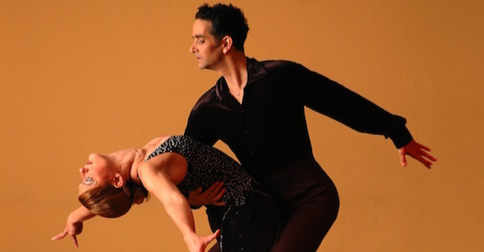 Politics and ‘reality’ television are mingling these days. The American Republican Party is reeling from the insurgency of Apprentice star Donald Trump, while last year’s rout of the British Labour Party has propelled Shadow Chancellor Ed Balls first to the BBC’s Sport Relief Great British Bake Off and now to its Strictly Come Dancing (the format of which is exported internationally as Dancing with the Stars).
Politics and ‘reality’ television are mingling these days. The American Republican Party is reeling from the insurgency of Apprentice star Donald Trump, while last year’s rout of the British Labour Party has propelled Shadow Chancellor Ed Balls first to the BBC’s Sport Relief Great British Bake Off and now to its Strictly Come Dancing (the format of which is exported internationally as Dancing with the Stars).
Strictly, as the show is widely known, is one of a small number of words containing the sequence ctl, most of which end in -ly. By far the most common are the four words perfectly, exactly, directly and strictly.
The t in the sound sequence ktl is liable to be weakened or lost altogether. It can sound over-careful and rather artificial when the t is clearly pronounced, as it is by this speaker (with -tly repeated):
It’s far more common, even in quite careful speech, for native speakers to articulate the t weakly or not at all, so that strictly can sound like strickly:
Likewise perfectly, exactly and directly can sound like perfeckly, exackly and direckly:
(Notice how the last speaker is unusually careful about exploding the t in it and the p in steepness, but not the t in directly.)
Lastly, here is Britain’s new Prime Minister Theresa May:
Further notes
The process which can weaken or eliminate the t in words like perfectly can also apply to words like firstly and phrases like first class. Please see my post First class box sets. A key factor is that the consonant before the t shares its voicelessness.
Cooperation
 Words which non-natives rarely pronounce natively include cooperate, cooperative, cooperation and coop (also written co-operation, co-operate, co-operative and co-op).
Words which non-natives rarely pronounce natively include cooperate, cooperative, cooperation and coop (also written co-operation, co-operate, co-operative and co-op).
In native pronunciation, coop- is two syllables, and the transition between them is a w type sound. We could write this in various ways depending on the accent: kəwɔp, kowɑp, etc. Dictionaries don’t generally write the w, but I think it would probably help the non-native speaker if they did. Here are native cooperate, cooperative and cooperation, each word followed by its beginning:
Non-natives typically pronounce coop- as it’s written, with a single o quality and no w. Unfortunately, this is likely to sound like corp- as pronounced in England and Wales. As a result, non-native cooperation can sound rather like native corporation:
And non-native cooperate can sound rather like native corporate:
To highlight the difference, here is Russell Brand using both corporate and cooperate, followed by corp- and coop- (slightly slowed down):
The two syllables of kəwop or kowop can weaken towards one-syllable kwop. This means that the beginning of coop- can sound rather like the beginning of quality:
Further notes
An unrelated one-syllable word coop, rhyming with scoop, loop and troop, refers to an enclosure in which chickens or other poultry are kept.
People fool in love
The above video of Ed Sheeran’s song Thinking Out Loud has so far had over 1.25 billion views. Some of its viewers are puzzled by Ed Sheeran’s pronunciation of the line people fall in love in mysterious ways. Here is one contributor to a forum:
…he sings (or atleast it sounds like) “fool” instead of “fall”…
Why does he do that? Is it because he wants to be sing weird and different? Am I crazy or is that the worst thing? ugh it makes me angry just thinking about it.
To which someone replied:
He’s English, so maybe it’s that?
Here’s a clip of the phrase:
Pop singers do sometimes pronounce words in distinctive ways. There’s even an article at Psychology Today in which Siu-Lan Tan suggests various reasons, eg “To define their individual sound, like a sonic signature that makes them distinct.”
But it’s also likely that Sheeran’s English accent is involved. An increasing number of speakers in England, particularly southern England, give fall and fool the same pronunciation. This is visualized beautifully at the Our Dialects site, which is based on fieldwork carried out by Manchester University undergraduates. According to their data on fool and fall, in southern England “29% of speakers pronounce the two words the same.”
Our dialects – FOOL-FALL
Hughes et al. propose that, given its intermediate location between the South West and South East, Southampton features an accent with very distinctive Southern qualities; this is expressed by, amongst other things, a neutralisation of vowels preceding the consonant /l/ (2012: 90).
The site even lets us zoom in to reveal speakers with fool = fall only a few miles from the small Suffolk town of Framlingham where Ed Sheeran grew up (green dots for speakers with fool = fall, red dots for those who differentiate the words):
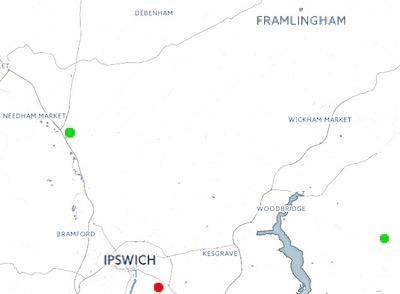 Speakers of this type may give the same pronunciation to other words which rhyme with fool and fall. We can hear evidence of this if we listen to Sheeran himself being interviewed. Here he might be saying Pool McCartney:
Speakers of this type may give the same pronunciation to other words which rhyme with fool and fall. We can hear evidence of this if we listen to Sheeran himself being interviewed. Here he might be saying Pool McCartney:
And this might conceivably be These a rule not conventionally attractive people:
but of course he’s saying These are all…
I continue this topic on my Speech Talk blog.
On and on
 Today, another in my series of posts on small, frequent English words which are tricky for non-natives because some are generally strong and some are generally weak.
Today, another in my series of posts on small, frequent English words which are tricky for non-natives because some are generally strong and some are generally weak.
So far I’ve considered the numerals one, two and four, which are usually strong; the prepositions to and for, which are usually weak; and the strong-weak pair of words which are both written that. This same strong-weak distinction exists between on and and.
The conjunction and is often pronounced weakly as /ən/, with the colourless vowel schwa, and without its final /d/. This form is usual when and conjoins two words of the same type, even in careful speech styles like lecturing and newsreading. Here are War and Peace, Romeo and Juliet, Pride and Prejudice, Sense and Sensibility, all with and pronounced as /ən/ or /n/:
The preposition on, on the other hand, generally does not weaken, but rather keeps its full vowel. The quality of the vowel depends on the speaker’s accent; the British pronunciation is usually transcribed /ɒn/. The strength of on keeps it distinct from weak and.
A good way to illustrate this distinction is with native speaker recordings of the common phrase on and on, /ɒn ən ɒn/:
producing the same wonderful images
know when to stop
The word and may be pronounced strongly for emphasis. In this documentary narration, the speaker emphasizes the duration of an earthquake by saying the quake goes on… /and/ on… /and/ on:
In the phrase on and on, both instances of the word on are likely to be accentuated. But even when the word on is not accentuated, as in the phrase life on earth, it’s likely to keep its full vowel. Here are several speakers saying life on, taken from the phrase life on earth:
By contrast, here are speakers saying life and, from the phrase life and death:
You should be able to hear that the instances of and are /ən/, while the instances of on retain their full vowel.
That that
 Today I’m continuing to look at small, frequent English words which are tricky for non-natives because some are generally strong and some are generally weak.
Today I’m continuing to look at small, frequent English words which are tricky for non-natives because some are generally strong and some are generally weak.
In the past three posts I’ve considered the numerals one, two and four, which are usually strong, and the prepositions to and for, which are usually weak. Non-natives often pronounce two and to similarly, likewise four and for, but they should be kept distinct.
The same kind of distinction exists between the two words written that. One that is demonstrative (or ‘pointing’), as in that book or that’s my car. Demonstrative that is strong and transcribed /ðat/ (or /ðæt/). The other that is the conjunction that, which links to a subordinate clause, eg show me that you care or the things that I like. Conjunction that is usually weak, containing the colourless vowel schwa, /ə/, which is not shown in spelling. It’s important to understand that the weakening of conjunction that, like the weakening of to and for, happens even in careful speech styles like lecturing and political speech making.
To illustrate the distinction between the two kinds of that, here are real utterances in which native speakers say the conjunction and the demonstrative in sequence, /ðət ðat/:
Those who think of speech only in articulatory terms may see weakening as the lazy articulation of unimportant words. This misses the point that speech is a communicative system designed for perception and understanding. English makes communicative use of the strong/weak distinction to differentiate words. If you remain chained to the spellings and never weaken words like to, for and conjunction that, you’re not speaking less lazily – you’re disregarding a communicative distinction in the English language.
For four
 Today on the UCL Summer Course in English Phonetics, I’m lecturing about small, frequent English words which are tricky for non-natives because some are generally strong and some are generally weak. It’s also the topic I’m currently addressing in these weekly posts.
Today on the UCL Summer Course in English Phonetics, I’m lecturing about small, frequent English words which are tricky for non-natives because some are generally strong and some are generally weak. It’s also the topic I’m currently addressing in these weekly posts.
Two weeks ago I discussed the word one, which is strong because it’s a numeral. Last week I turned to the numeral two and the preposition to, which are pronounced very differently by native speakers of English: two is strong, while to is usually weak, becoming /tə/ or just /t/ before a consonant.
The distinction between two and to also applies to four and for. The numeral four is strong, and has a long vowel in Southern British English, conventionally transcribed /fɔː/. But the preposition for is usually weakened to /fə/ or even /f/. (In North America, Ireland and Scotland, the final r of both four and for is always pronounced.)
The weakening of for applies both within a single word, eg forget, forgive, and in consecutive words, eg for sale, for years. Like the weakening of to, this happens even in relatively careful speaking styles, like teaching or newsreading. That is, natives generally use weakening to show the difference between four and for. If you never weaken the word for, you’re not speaking more clearly – you’re failing to observe a distinction!
A good way to illustrate this is with real utterances in which native speakers say the words for four in sequence: /fə fɔː/ or /f fɔː/. Notice the weakness of for and the prominence of four:
The word for may be pronounced strongly if it isn’t connected to an immediately following word. This can occur when the speaker hesitates:
To two
 Today is the first day of UCL’s annual Summer Course in English Phonetics (SCEP), of which I’m Director. A warm welcome to this year’s pronunciation enthusiasts, who’ve come from sixteen different countries. This SCEP-season, my weekly posts are looking at small, frequent English words which are tricky for non-natives because some are generally strong and some are generally weak.
Today is the first day of UCL’s annual Summer Course in English Phonetics (SCEP), of which I’m Director. A warm welcome to this year’s pronunciation enthusiasts, who’ve come from sixteen different countries. This SCEP-season, my weekly posts are looking at small, frequent English words which are tricky for non-natives because some are generally strong and some are generally weak.
Last week I discussed the word one. Like the other numerals, one is strong, and often accented so that it stands out in pitch. This week let’s look at the next numeral, two, and the preposition to. Many non-natives give identical or very similar pronunciations to two and to. Natives, on the other hand, generally make a phonetic distinction between them, so that I want to fish sounds different from I want two fish.
Like one, the numeral two is strong and has a full, clear vowel: in conventional transcription, /tuː/. To, on the other hand, is usually very weak: when followed by a consonant, it’s typically weakened to /tə/ or just /t/. This applies both within a single word, eg today, together, and in consecutive words, eg to come, to London. It’s important to understand that this happens even in relatively careful speaking styles, such as teaching or newsreading. If you never weaken the word to, you’re not speaking more clearly – you’re failing to observe a distinction!
A good way to illustrate this is with real utterances in which native speakers say the words to two consecutively: /tə tuː/ or /t tuː/. Notice the weakness of to and the prominence of two:
The word to may be pronounced strongly if it isn’t connected to an immediately following word. This can occur when the speaker hesitates:
One rainy day
 I often ask those I teach to read aloud the text Arthur the Rat. As explained by Michael MacMahon of Glasgow University, this began as a children’s story by Gertrude Sellon, published in 1876. She told it (literally) “in words of one syllable”, so the rat’s original name was not the disyllabic Arthur, but Grip. The phonetician Henry Sweet adapted the story for his Primer of Spoken English (1890), and it was subsequently developed by others so as to reveal various aspects of the reader’s speech.
I often ask those I teach to read aloud the text Arthur the Rat. As explained by Michael MacMahon of Glasgow University, this began as a children’s story by Gertrude Sellon, published in 1876. She told it (literally) “in words of one syllable”, so the rat’s original name was not the disyllabic Arthur, but Grip. The phonetician Henry Sweet adapted the story for his Primer of Spoken English (1890), and it was subsequently developed by others so as to reveal various aspects of the reader’s speech.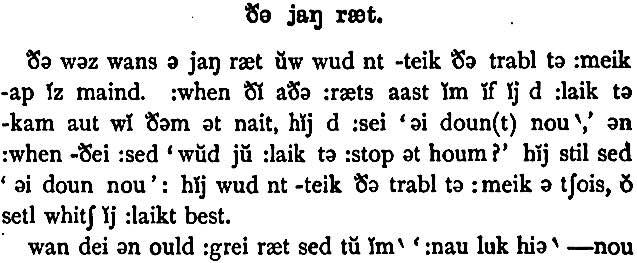 Sweet’s second paragraph begins one day, but in the modern version it’s one rainy day. This is a phrase which I hear many non-natives reading differently from the typical native pronunciation. Here are some readings by non-native speakers:
Sweet’s second paragraph begins one day, but in the modern version it’s one rainy day. This is a phrase which I hear many non-natives reading differently from the typical native pronunciation. Here are some readings by non-native speakers:
Each of those speakers puts more emphasis on rainy than on one: there’s a step up in pitch from one to rainy. Native speakers, on the other hand, are likely to make one at least as prominent as rainy, often more so. Here are some readings of one rainy day by native speakers: first the British phoneticians David Abercrombie and Peter Ladefoged, then the American phonologist Bruce Hayes:
Those readings are not identical, but in all of them the word one is given a rather high pitch and the word rainy is no higher. Just to show that this is not an artificial pronunciation by professors, here are some American students doing the same thing:
Numerals (one, two, three etc) are generally strong in English. They’re often accented, so that they stand out in the intonation contour. (This makes one very different from the indefinite article a(n), which is generally very weak, whereas in many languages they’re the same word.) Furthermore, when an English phrase contains three stressed words, the middle one is often made less prominent than the first one and the last one, giving eg one rainy day.
The same can be found with other phrases in which one (or any numeral) is followed by an adjective plus a noun. Below are some examples; notice, in the cases where one is preceded by other words, that the pitch steps up onto the word one:
Further notes
Another post in which I deal with one is I have one question.
Many old recordings of Arthur the Rat, including the one by Abercrombie, are available online from
University of Edinburgh. School of Philosophy, Psychology, and Language Sciences. Department of Linguistics and English Language. (2013). Arthur the Rat, 1949-1966 [sound]. The recordings of Ladefoged and Hayes accompany Ladefoged’s A Course in Phonetics. The American student recordings are available here.


